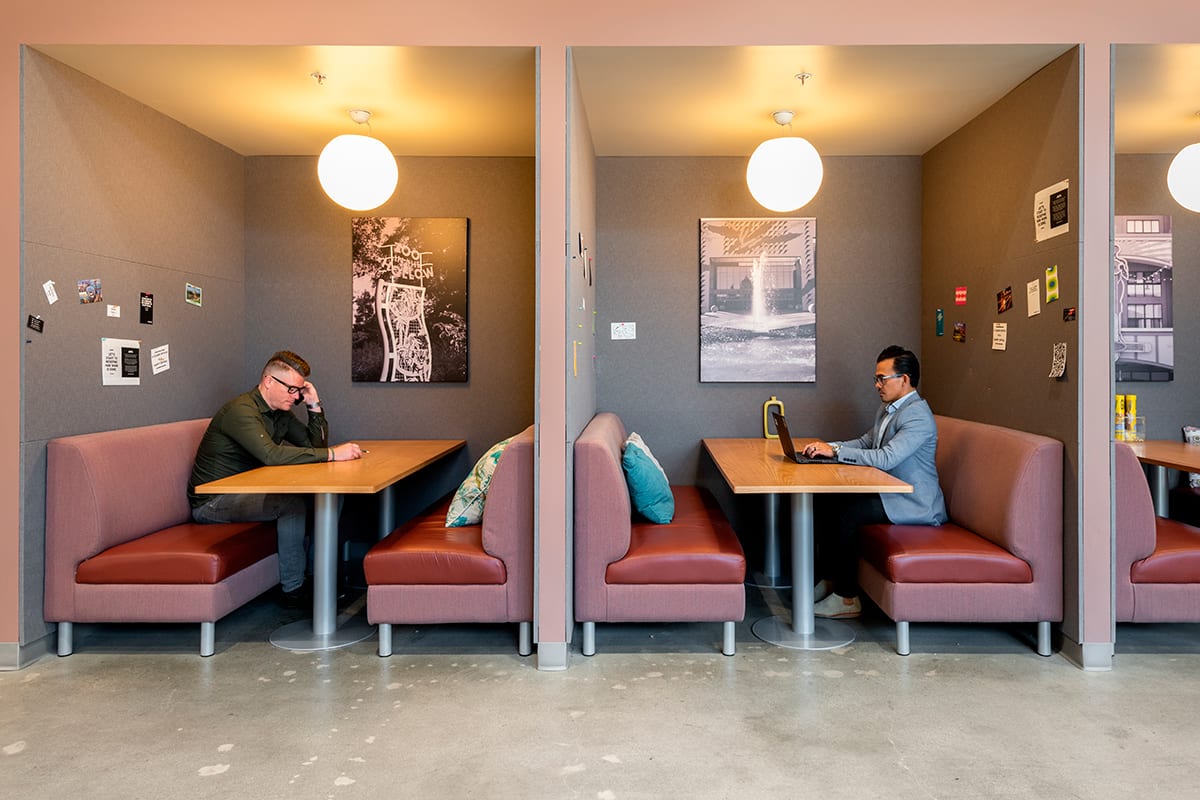Coworking hubs are not just for freelancers and startups – and savvy corporate real-estate directors are reaping the benefits
It’s understandable why, at first glance, stereotypical coworking hubs may not seem ideal for corporations. Images of software developers huddling round a large table, or meetings conducted while seated on beanbags, probably don’t sit well with certain company cultures. Businesses that handle sensitive data, or industries that require quiet, segregated space with specialised equipment will most likely balk at the idea of collaborative workspace shared with other organisations.
However, while coworking may have some of these qualities – which may actually be invaluable for creative enterprises – it’s not the full story. Of course, freelancers and startups may choose to rent a desk in these working environments for their communal aspect, valuing the chance to build their professional network. But there’s more to coworking hubs than just the collaborative, trendy atmosphere, and recent studies show that large companies are recognising the benefits of these next-generation flexible workspaces (or flexspace).
According to Gensler Research Institute’s US Workplace Survey 2019, 14% of respondents working for companies of 100 or more employees said they use coworking space for part of their typical working week. And IWG’s 2019 Workspace Survey found that 75% of FTSE 100 companies incorporate some element of flexible workspace into their property portfolio. So, these workspaces aren’t just for the one-man-band running a business from a laptop – corporate real-estate professionals (CREs) are finding viable solutions for their company in flexspace too.
Interestingly, the Gensler study also found that in regions where the coworking sector was more mature – such as in the UK – large companies aren’t necessarily using coworking spaces on an individual membership or on-demand basis. Instead, they are customising their own areas of coworking office locations – creating bespoke, professional, private workspace for their employees within the same building.
Why not just hire conventional office-space instead? First of all, CREs are realising how useful flexspace can be in volatile economic times. Unlike traditional office space, where businesses are more likely to be tied into a lengthy lease with a fixed number of square metres, flexspace offers an entirely different proposition. It lets corporations opt for much shorter leases, and upscale or downsize the amount of workspace they are hiring as their business outlook changes. Taking a more flexible approach to corporate real-estate helps companies mitigate risk in the face of uncertainty, which is one reason it’s proving increasingly popular with large companies (particularly those from industries that are especially vulnerable during a recession).
For CREs looking to build a global workspace portfolio that meets their company’s needs – rather than a one-size-fits-all solution – partnering with a trusted flexspace provider with a global reach is a strong move. IWG is a multi-brand company with options including Regus, Spaces, Signature, HQ and No18, all of which cater to different working styles. So, not only can IWG help CREs source flexspace at more than 3,500 locations around the world, it can work with them to decide which brands would be best-suited to regional teams or departments with different needs.
This illustrates how far the role of the CRE professional has changed. These days, companies understand the role workspace has to play in talent retention and productivity, and CREs are expected to help fulfil this with the strategic choices they make. As coworking hubs and flexible office locations pop up in new places all over the world, we’re starting to see more high-quality, design-led, inspiring office space materialise in places that could potentially cut employees’ commute times in half. Therefore, it’s easy to see how flexspace can be a powerful incentive for holding onto team members, by helping them create a better work/life balance, and giving them a more aspirational working environment.
And, while buzzy communal workspace might not be the right fit for everyone, the future of coworking is that these spaces are evolving to offer more. Corporations are taking advantage of the carte blanche they’re given with flexspace to move in to a convenient location on a shorter-term basis, create their ideal work set-up from scratch, and alter the amount of space they are using as and when they need to.
Find out how coworking space could benefit your company






